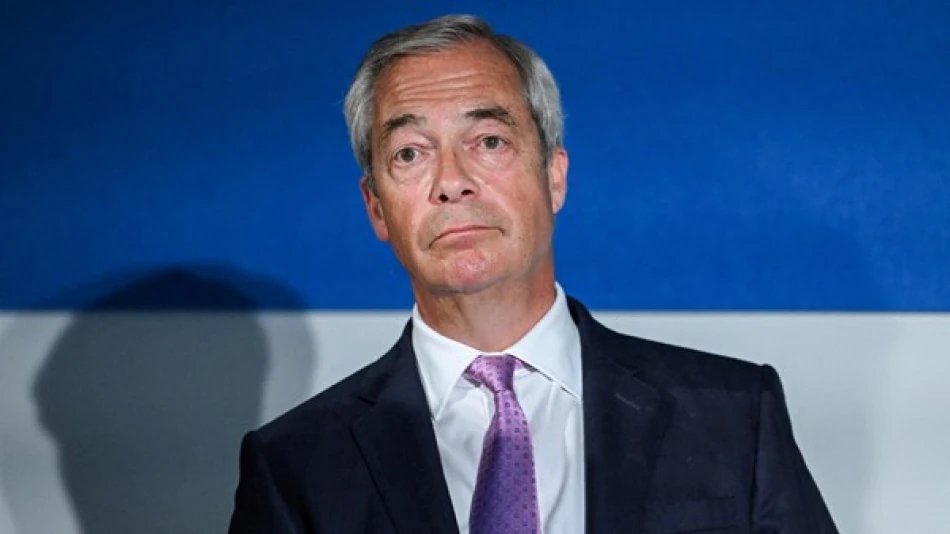
UK Politician Unveils Plan for Mass Asylum Seeker Deportation
Farage's Reform Party Proposes Mass Deportation Plan as Immigration Dominates UK Political Agenda
Nigel Farage, leader of Britain's Reform Party, has unveiled an ambitious and controversial immigration strategy that would see the UK withdraw from the European Convention on Human Rights and implement what he calls "mass deportation" of asylum seekers who crossed the English Channel. The proposal comes as Reform Party leads recent polling, capitalizing on immigration concerns that now outrank economic issues among British voters.
The Deportation Blueprint
Speaking to The Times, Farage outlined a comprehensive plan that would fundamentally reshape Britain's approach to asylum policy. The strategy involves negotiating return agreements with countries including Afghanistan and Eritrea—nations with questionable human rights records—to facilitate the removal of asylum seekers who arrived via small boats across the English Channel.
The logistical scope is staggering: Farage proposes constructing detention facilities capable of holding 24,000 migrants at disused air bases, costing £2.5 billion ($3.4 billion). The plan calls for five daily deportation flights, potentially removing hundreds of thousands of people over time.
Trump-Style Hardline Approach
Farage explicitly referenced Donald Trump's immigration policies as a model, suggesting that being "very tough" with other countries yields better results than diplomatic niceties. This comparison signals a potential shift toward the confrontational immigration stance that characterized Trump's presidency, including family separations and rapid deportations.
Human Rights Concerns Take Backseat
When pressed about the safety of deportees returning to countries with poor human rights records, Farage dismissed these concerns, stating he's more worried about threats posed by asylum seekers to British citizens. His comment about being "responsible for the safety of women and girls on our streets" echoes populist rhetoric linking immigration to public safety—a narrative that has gained traction following recent protests outside hotels housing asylum seekers.
The proposed withdrawal from the European Convention on Human Rights would remove a key legal barrier to such deportations, following similar suggestions from previous Conservative governments that ultimately proved too politically costly to implement.
Political Momentum Behind Immigration Hardline
Reform Party's rise in polling reflects a broader European trend toward immigration skepticism. Unlike previous UK election cycles where economic concerns dominated, current polling shows immigration and asylum as voters' primary worry. This shift has created political space for more radical solutions that mainstream parties have avoided.
The numbers driving this concern are significant: 37,000 people reached Britain via small boat crossings in the previous year, creating visible pressure on accommodation and processing systems. Limited protests at asylum seeker hotels, while not widespread, have generated media attention that amplifies public anxiety.
International Precedents and Challenges
Farage's proposal resembles Australia's controversial "Pacific Solution," which diverted asylum seekers to offshore processing centers, and Denmark's attempts to relocate refugees to Rwanda. However, such policies face substantial legal and diplomatic obstacles, particularly regarding countries unwilling to accept deportees who aren't their citizens.
The plan's £2.5 billion price tag also raises questions about fiscal priorities, especially given Reform Party's broader promises of tax cuts and reduced government spending. Critics will likely argue that such funds could address root causes of migration or improve legal immigration processing instead.
Electoral Calculation
Reform Party's current polling lead, despite holding only five parliamentary seats from the last election, demonstrates how immigration concerns can rapidly reshape political landscapes. Farage is betting that voters' frustration with incremental approaches will translate into support for dramatic policy shifts, regardless of implementation challenges or international criticism.
The proposal represents a significant escalation in UK immigration rhetoric, moving beyond deterrence toward active removal of existing asylum populations. Whether this approach proves politically sustainable or practically achievable will likely define Reform Party's trajectory and influence mainstream party positions on immigration policy.
Most Viewed News

 Layla Al Mansoori
Layla Al Mansoori






